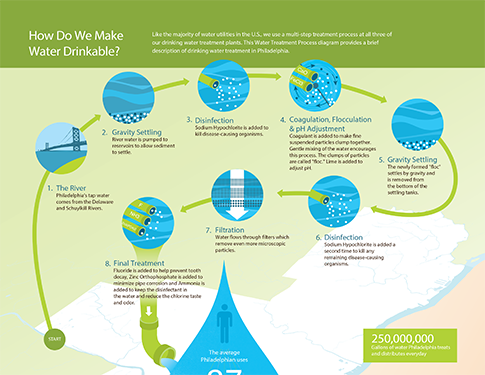
A section of the 2015 Drinking Water Quality Report showing how we treat tap water. Click for a larger image. Credit: Philadelphia Water.
Apologies to anyone looking forward to reading our annual Drinking Water Quality Report down the shore this summer, but we just have to get this out there: All the data we collected for the 2015 report confirms our rigorous treatment and testing are resulting in top-quality tap water that meets or beats all quality standards set by the federal government.
Of course, we knew that going in, but we put out the Drinking Water Quality Report—now available online in English and Spanish—every year because we believe our customers are empowered by having all the information that’s out there about their drinking water and what we do to make it safe and available to 1.7 million people 24 hours a day, seven days a week.
“Our annual Drinking Water Quality Report tells the story of how we make this happen through our continuous treatment, testing, and monitoring,” Philadelphia Water Commissioner Howard Neukrug writes in the introduction. “This report, published in the spring of 2015, includes water quality information for the 2014 calendar year. We, along with our partners at the U.S. Environmental Protection Agency, hope you take the time to look this document over and, if you have any questions, my staff and I would be very pleased to discuss.”
Looking at this year’s report, we’re proud to say that our water consistently meets (and often exceeds) the quality criteria set by the EPA; we go above and beyond what is required, producing approximately 275 million gallons of drinking water every day that exceed national safety standards.
How do we do it?
It starts with fighting to protect our source waters—the Delaware and Schuylkill rivers—from pollution. We follow that up with cutting-edge treatment techniques at our three drinking water plants, and maintain thousands of miles of pipes to make sure the water gets to customers safely and efficiently.
But one of our most important tools in every step of the process is sophisticated testing.
“Philadelphia Water conducts laboratory tests on river water, water being treated, water being sent to our customers, and wastewater coming back from our customers,” says Gary Burlingame, director of our Bureau of Laboratory Services division. “The regulations do not require all of this testing, only a basic minimum. We go beyond the minimum to continually check on the quality of the water throughout the city.”
Philadelphia Water collects more than 2,500 water samples every month, says Burlingame, resulting in more than 10,000 monthly lab tests at various stages of the urban water cycle.
“Because we collect so many lab test results every month, we have a specialized data management system to store and organize the thousands of data points that are entered,” Burlingame says. “Then, just as important, we have scientists and engineers who review the data continually to make sure that the quality standards that we set are being met.”
In addition to important information about our testing results and treatment process, the report is packed with useful things like contact numbers and tips for getting involved in protecting your local streams, rivers and water supply.
You can download a copy of the full report from Phila.gov/water in English here and in Spanish here.
While we send out notices about the report to all customers, not everyone knows it’s available.
Please share this information with all the other people who drink our water, especially those who may not have received a notice directly (for example, people in apartments, nursing homes, schools and businesses). You can help by posting this blog on social media, by putting a copy of the report in a public place, or by distributing copies by hand or mail.
To receive a printed copy of this report, please email: waterquality@phila.gov.
Want to stay up to date on the latest Green City, Clean Waters news and get important Philadelphia Water updates? Subscribe to our monthly newsletter now by clicking here!